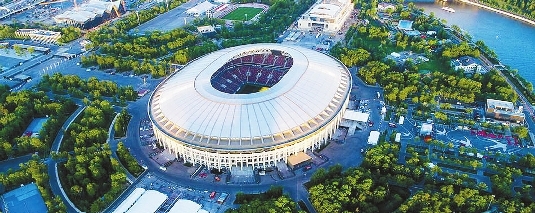
THE latest of the Vladimir Putin-era mammoth global events — and possibly the last such to be hosted by Russia in the foreseeable future — kicked off in Moscow on Thursday. The FIFA 2018 soccer World Cup got underway with a long-awaited match between Russia and Saudi Arabia in Moscow’s newly renovated Luzhniki Stadium. At least half a million visitors from all over the world will visit Russia to attend the quadrennial event, the globe’s foremost professional sporting competition. Barring the unpredictable, Russia 2018 is likely to be successful. And for Putin, who has made a conscious policy over the past decade to invite the world to come and experience familiar events amid Russian venues, it should at least partially satisfy an even more important goal. The efforts around the Cup — which, like the Sochi Winter Olympics and other events before it, the Kremlin spent enormous amounts of the public’s money — are meant to bolster Russian infrastructure, stir national pride, and spotlight the country’s modernity to the world. “These events were conceived to demonstrate Russian engagement with the world and to generate a positive image of the country in the eyes of foreigners,” said Andrei Kortunov, head of the semi-official Russian Council for International Affairs. Russia has spent at least US$12 billion on new stadiums, transport links, hotels, and other infrastructure. Most construction targets have been met, and despite some controversy and charges of corruption, the costs appear to have been kept under control. The Kremlin insists that investment will pay off after the games end in terms of more tourism and improved quality of life for local inhabitants — a claim that has proven partially true in previous cases, such as the Sochi Olympics. The threat of hooliganism, terrorist attack, or disruption by political activists has been largely neutralized by the introduction of special security regimes in most cities. People who live or work near a World Cup stadium will be required to have a special pass to navigate police cordons to reach their homes or offices. No-fly zones for drones and aircraft have been introduced around all venues for the duration of the games. Searches will be conducted on buses and trains headed for cities where games are taking place, and draconian controls on alcohol sales and consumption will be enforced. About 450 known hooligans have been identified by police, forbidden by court orders to attend any games, and placed under surveillance. (SD-Agencies) | 
